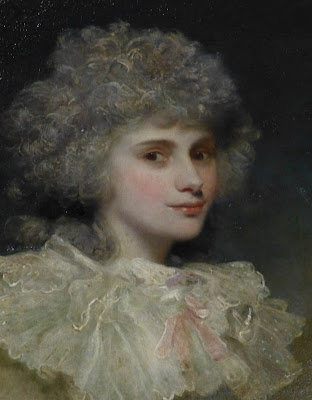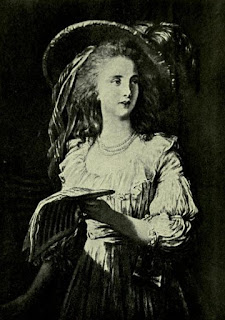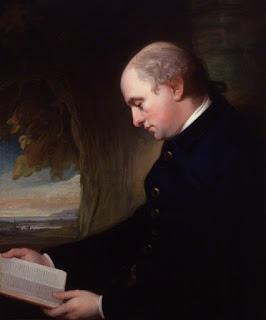 |
| Lady Elizabeth Foster, later Duchess of Devonshire, in South Sketch Gallery, Chatsworth |
Profile
Lady Elizabeth Foster (baptised 13 May 1758 - 30 March 1824) was the intimate friend of Georgiana, Duchess of Devonshire, and the mistress of Georgiana's husband, William Cavendish, 5th Duke of Devonshire. She became the Duchess of Devonshire after Georgiana's death.
Early years
Elizabeth Christiana Hervey was baptised on 13 May 1758 in Horringer, Suffolk, the daughter of Frederick Hervey and Elizabeth Davers. The family moved to Ireland when Hervey was appointed Bishop of Cloyne (1767) and then Bishop of Derry (1768) through the influence of his brother. Elizabeth, known as Bess, spent her childhood in relative poverty, in Ireland and on the continent. The family fortunes changed drastically when Hervey became 4th Earl of Bristol in December 1779, but by this time, Bess was already married.
A short-lived marriage
On 16 December 1776, Bess married John Foster, an Irish MP. She had two sons, Frederick (1777) and Augustus (1780), but the marriage was not a success and in 1780, the couple separated. Foster was unfaithful, but on her side, Bess may have been regretting marriage to someone beneath her newly elevated status as Lady Elizabeth Foster. Bess gave up custody of her sons to Foster and returned to England, where she was forced to live in reduced circumstances.
The Duke and Duchess of Devonshire
 |
| Georgiana, Duchess of Devonshire in South Sketch Gallery, Chatsworth |
In 1782, Bess met the Duke and Duchess of Devonshire in Bath. Seeing an opportunity to improve her circumstances, she attached herself to the emotionally-starved Duchess, with whom she formed an instant bond. She succeeded so well that when Georgiana went home, Bess was invited to accompany them. Eager to please, Bess provided the Duke with the companionship he needed and at some point became his mistress.
Intrigues abroad
Georgiana’s mother, Lady Spencer, was keenly jealous for Georgiana’s position and encouraged the Cavendishes to send Bess abroad for her health. Bess duly left for France in December 1782, acting as governess to Charlotte Williams, the Duke’s natural daughter. The doors of Parisian high society were closed to her as a governess, but she enjoyed the freedom of being on her own in receipt of a large income.
Rumours drifted back to the Duchess that Bess was involved in scandalous behaviour in Italy. Bess hastened to reassure Georgiana but did not hurry to return home, afraid that she would have lost her influence after the birth of Georgiana’s daughter. Eventually, Bess was persuaded to return to Devonshire House, in July 1784.
A secret birth
She did not remain long. At the end of 1784, Bess went abroad again, ostensibly for her health. The reality was that she was pregnant. This time, she was given letters of introduction to the Duchesse de Polignac to enable her to move in polite society in Paris. Despite carrying the Duke of Devonshire’s child, she became mistress to the Duke of Dorset.
 |
| Duchesse de Polignac from Seven Splendid Sinners, by WRH Trowbridge (1908) |
When her pregnancy could no longer be hidden, she fled to her brother in Naples and confessed all. He arranged for her to have the baby in a squalid inn and quickly reappear in society to preserve secrecy. In July 1786, Bess left her daughter, Caroline, with the elderly Comte St Jules who agreed to accept paternity, and finally acquiesced to the Duke and Duchess’ pleas for her to come home.
Ménage à trois
By this time, Georgiana could no longer be in any doubt about the relationship between her husband and her best friend, but, to the amazement of society, she accepted the strange threesome, or ménage à trois. It is unclear whether this was due to Georgiana’s emotional dependence on Bess or whether Bess was blackmailing her over her massive debts which she was anxious to conceal from the Duke.
 |
| William Cavendish, 5th Duke of Devonshire after Sir Joshua Reynolds stipple engraving pubd 1808 NPG D13723 © National Portrait Gallery, London |
An illegitimate son
In 1788, Bess was pregnant again and went abroad to have her child. She had her son, Augustus Clifford, in relative comfort, and left him with foster parents before returning to England. There was some question about Augustus’ paternity, as Bess had also had an affair with the Duke of Richmond, but the Duke of Devonshire accepted that the child was his. Two years later, she succeeded in having Caroline and Augustus brought to England, to be raised with the Cavendish children.
The bonds of friendship
After the birth of her son in 1790, Georgiana confessed her debts to the Duke. Bess stood by her throughout the ordeal. But the real test of her friendship came the following year when Georgiana was banished abroad because she was carrying Charles Grey’s child. Bess went with her.
After two years abroad, the Duke relented, and Georgiana and Bess came home in the autumn of 1793. They resumed their strange ménage à trois, but Georgiana and the Duke were getting on much better than before, and Bess feared that her influence was waning.
The Duke of Richmond
Anxious for her long-term future, Bess rekindled her affair with the Duke of Richmond and became his mistress. When, in 1796, both the Duchess of Richmond and her own husband died, she expected the Duke to marry her. But after many months of waiting, it was clear that the Duke had no intention of doing so.
 |
| Charles Lennox, 3rd Duke of Richmond and Lennox by George Romney 1775-7 NPG 4877 © National Portrait Gallery, London. |
The new Duchess of Devonshire
On 30 March 1806, Georgiana died. Bess was distraught. “She was the charm of my existence,” she wrote to her son, “my constant support in all my sorrows, the doubler and sharer of every joy.”1
Georgiana had secured her friend’s immediate future by making her sole guardian of her papers. The Cavendish children might resent her presence, but the Duke found he could not do without Bess to look after him.
Eventually, on 19 October 1809, the Duke and Bess were married. But Bess did not have long to enjoy the attainment of the position that she had coveted for so long. The Duke died on 29 July 1811, less than two years later.
Roman excavations
After the Duke’s death, Bess lived alone, in style, in Piccadilly before moving to Rome in 1816. Here, Bess found a new vocation as a devoted patron of the arts, in particular, archaeology. For eleven years, she funded the excavation of the Forum, enabling the recovery of the Column of Phocas and the stones of the Via Sacra. In Rome, she also found the last love of her life - Cardinal Hercule Consalvi, secretary of state to the Vatican.
 |
| The Forum, Rome |
Bess died in Rome on 30 March 1824 and was buried in the Cavendish family vault in Derby Cathedral.
Rachel Knowles writes
clean/Christian historical romance set in the time of Jane Austen. She has been
sharing her research on this blog since 2011. Rachel lives in the beautiful
Georgian seaside town of Weymouth, Dorset, on the south coast of England, with
her husband, Andrew.
Find out more about Rachel's books and sign up for her newsletter here.If you have enjoyed this blog and want to encourage me and help me to keep making my research freely available, please buy me a virtual cup of coffee by clicking the button below.
Note
1. From a letter from Lady Elizabeth Foster to her son Augustus (9 July 1806).
Sources used include:
Bell, John, La Belle Assemblée (John Bell, 1810, London)
Bourke, Hon. Algernon, The History of White's (1892)
Cavendish, Georgiana, Duchess of Devonshire and others, The Two Duchesses, Family Correspondence ed by Vere Foster (Blackie & Son, 1898, London)
Foreman, Amanda, Cavendish, Elizabeth Christiana, Duchess of Devonshire, Oxford Dictionary of National Biography (OUP 2004, online edn May 2010, accessed 11 Oct 2012)
Foreman, Amanda, Georgiana, Duchess of Devonshire (HarperCollins, 1998, London)
Horringer Parish Registers with biographies (1900)
Trowbridge, WRH, Seven Splendid Sinners (1908)
Photographs © Regencyhistory.net


I love the last bit; 'the last love of her life- Cardinal Hercule Consalvi...'; I wonder , did he go on to become Pope by any chance? Hypocrisy seems to have been a way of life back then.
ReplyDeleteJust being facetious re the Pope :)
I love your posts they're bringing a way of life in England that I never knew existed; I always stopped short at Elizabeth R, and then jumped to the 20th century, Just look at all the fun and games I've missed out on, I certainly have some catching up to do.
ReplyDeleteAnd to think I'd always imagined the Regency period to be so dull and boring and a prelude to Victorian era.
Interesting to learn more about Bess - it would be fascinating to know what the true motivation for her friendship with Georgiana.
ReplyDeleteShe seemed to have been a self-serving manipulator. This "menage a trois" managed to cause their children a lot of shame and grief. It's hard to respect any of the people involved.
DeleteShe was a survivor above all else. I don't know whether to hate her or to admire her tenacity.
ReplyDeleteI think that Lady Elizabeth Foster is a character who few people like. Lady Spencer certainly did not like her and resented her position in her daughter's household. I guess Lady Elizabeth had to be thick-skinned to survive. She was a true adventuress and eventually reached the pinnacle of her ambitions when she became Duchess, though she did not get long to enjoy her elevated status.
DeleteI think they acted as two smart women in an era where men were the master of their destiny.
DeleteHear, hearr!!!
DeleteI like to read about Georgiana and Bess. They were fascinating ladies.
ReplyDeleteIndeed they were, but I don't feel much sympathy for the scheming Bess.
DeleteGeorgina was in an arranged ambitious marriage. The most companionship she got out of it was probably with Bess. I think it must have been a great support to her to have Bess there.
DeleteIf that was the case, it only makes me feel more sorry for Georgiana.
DeleteReading about Bess for me is like watching a movie again and wishing it will have a different ending this time. It's history and can't be changed, but I keep hoping anyway.
DeleteIt is a sad story. I wonder whether Bess was ever truly happy. I rather like her connection with the archaeological excavations in Rome in the last decade of her life.
DeleteThank you for this fascinating information. Previously all I knew of Lady Foster was her relationship with the Devonshires. I think both ladies were constrained by social customs & male domination. How haunting are the similarities between Georgiana Spencer & her relative, Diana Spencer, Princess of Wales; both set fashion trends, adored their children, & were loved by everyone but their husbands.
ReplyDeleteHow did Bess Die?
ReplyDeleteSorry, I don't know. I haven't yet come across a source that tells me!
DeleteThink the 2 women did what they could to survive, in a world where men and money decides everything.
ReplyDeleteKindly Rikke